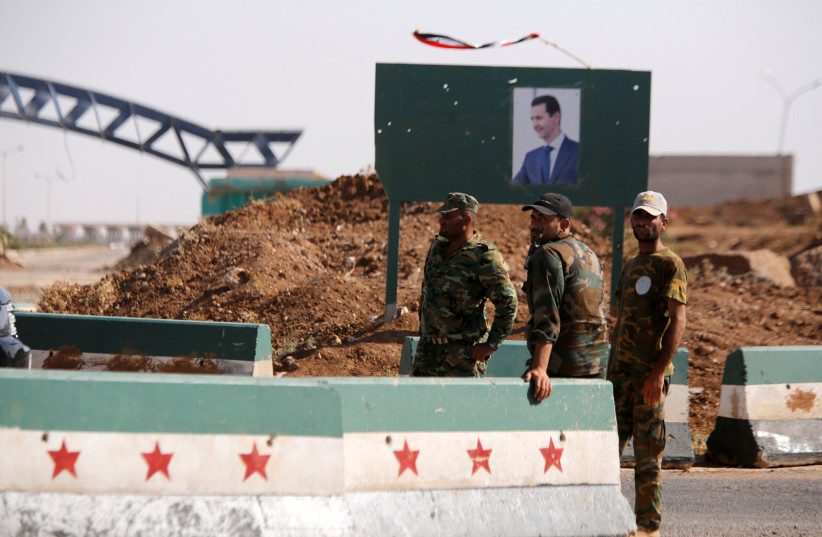Jordan has never treated Iran as threat to its national security, Jordanian Prime Minister Bisher Khasawneh told BBC Arabic on Sunday, despite earlier statements by both Jordan's King Abdullah II and security officials in the country to the contrary.
The Jordanian prime minister addressed drug smuggling along Jordan's northern border with Syria, saying there is an increase in smuggling operations. Jordan is conducting discussions with Syrian authorities on the matter.
When asked how much of this smuggling activity is linked to Iran, Khasawneh told BBC Arabic that there is a smuggling network extended across the region that "contributes to the financing of those who invest in this trade."
Khasawneh stressed that Russian forces had been providing security in southern Syria through a number of agreements, and theorized that a recent change in priorities due to the invasion of Ukraine had led to a smaller presence of Russian forces in the area, leading to an increase in smuggling operations.
BBC Arabic’s Murad Shishani proceeded to ask Khasawneh if Jordan treats Iran as a national security threat, with the prime minister responding "For our part, we have never dealt with Iran as a threat to our national security."

"We have fundamental observations about how Iran deals with some regional files and with some patterns and forms of interference in brotherly countries whose national security systems are considered by us as an integral part of the national security system of the Hashemite Kingdom of Jordan, including the sisterly Arab Gulf states," said Khasawneh to BBC Arabic.
The Jordanian prime minister's comments that his country has never viewed Iran as a threat to national security come a little over a month after King Abdullah II told the Hoover Institution at Stanford University that Iran and its proxies were filling a vacuum left by Russia in southern Syria, warning that this could lead to issues along Jordan’s borders.
“We want everybody to be part of a new Middle East and to move forward, but we do have security challenges. We’re seeing border attacks on a regular basis and we know who’s behind that," said the king when asked about Iran. “Do the politics, the negotiations that are going on between Saudi Arabia, the Gulf countries, the United States, that move Iran into a more positive light? I hope so. I’m not seeing it on the ground at the moment."
Last year, the king told CNN that Iranian-made drones and missiles had targeted Jordan in increasing numbers over the preceding year.
Iran's "ballistic technology has improved dramatically. We've seen that, unfortunately, against American bases in Iraq. We've seen Saudi Arabia being the recipient of missiles out of Yemen. Israel from Syria and Lebanon, to an extent," the king said.
"What misses Israel sometimes lands in Jordan... Add to that [the] increased cyberattacks on many of our countries. The firefights on our borders have increased almost to the times when we were at the high end with Da'esh [ISIS]," Abdullah stated as he highlighted the dangers to his kingdom.
Earlier, Brig.-Gen. Ahmed Hashem Khalifat, the director of Jordan’s Border Security Directorate, complained that the Syrian Army, Hezbollah and Iran were cooperating with drug smugglers along the Syrian-Jordanian border, according to Al-Ghad newspaper.
Jordanian forces are planning to use armed drones to deter drug smuggling and infiltrations along the northern and eastern borders of the country. Khalifat added that the northern border is one of the most dangerous for Jordan.
Jordan seeking 'good neighborly relations' with Iran
In the BBC Arabic interview on Sunday, the Jordanian prime minister added that Jordan is seeking to reach a formula with Iran based on "good neighborly relations" and already has a "very healthy relationship" with Iran.
Khasawneh did lament that Iran's "positions constituted a challenge to some brotherly countries regarding the exercise of a form of influence that did not necessarily serve the stability of these countries and posed a threat to other brotherly countries. In other words, there were a lot of Iranian hostile statements towards the Arab Gulf states."
The Jordanian prime minister expressed appreciation, however, that the "frequency of these threats" had become less frequent. "We are happy to see that the frequency of such threats or this descriptive verbal rhetoric that is escalating today is diminishing and receding."
Khasawneh's comments come less than two weeks after Iraqi Foreign Minister Fouad Hussein told Al-Arabiya that Baghdad was hosting talks between Jordan and Iran and Egypt and Iran. Earlier in June, Amwaj media reported that Iraq had been hosting talks between Iran and Jordan for nearly a year and that the talks had reached an "advanced" level.
Khasawneh downplays the king's 'Middle East NATO' statements
During the BBC Arabic interview on Sunday, Shishani also asked the Jordanian prime minister about recent statements by King Abdullah II in which the monarch said he would be "one of the first people" to endorse a Middle East NATO with a "very, very clear" mission statement. The king made the comments in an interview with CNBC on June 24.
Khasawneh responded that King Abdullah II had never spoken about an actual initiative and was only responding to a "hypothetical question," adding that Jordan had not been presented with any attempts to form a regional military framework.
